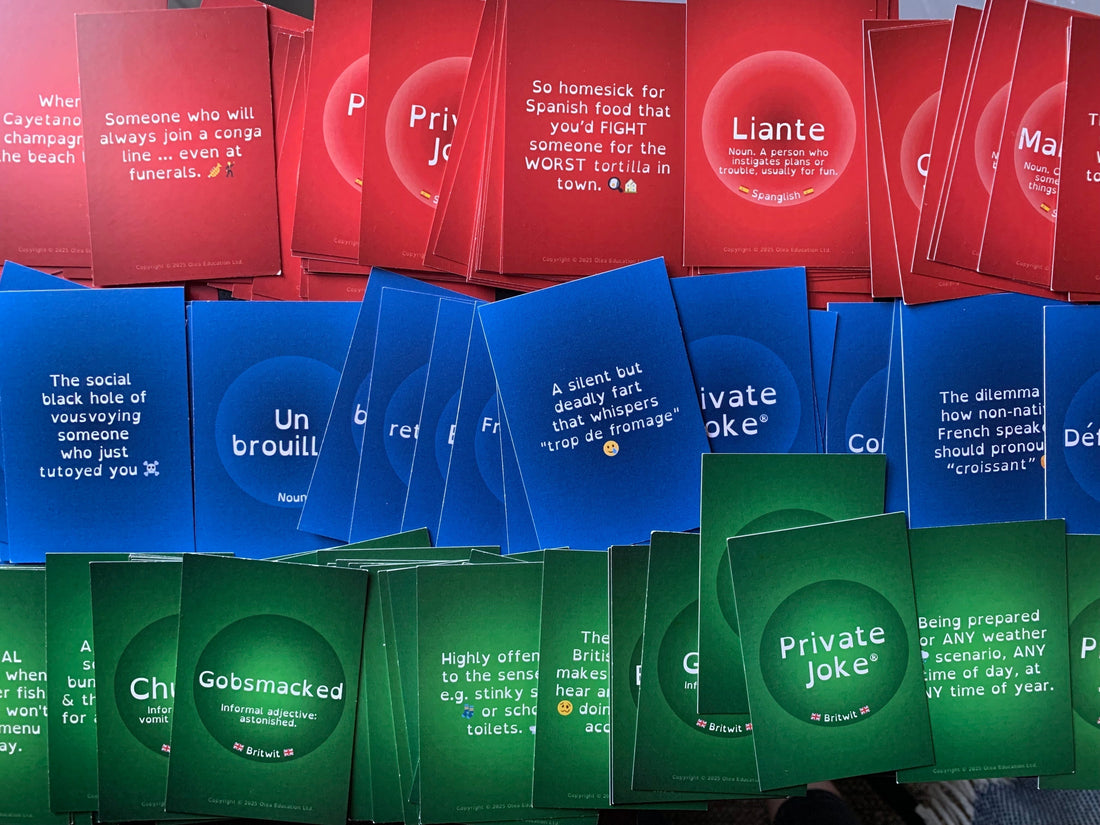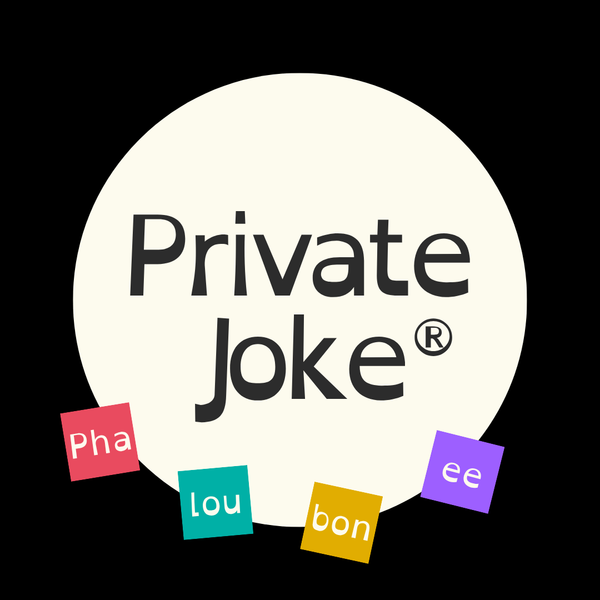
Listening to MFL Teachers: How Private Joke ® Turns Reluctant Learners into Laughing Linguists.
Share
In classrooms across the country, MFL teachers are wrestling with a familiar set of challenges. They’re not just delivering vocabulary lists and grammar rules, they’re fighting to win attention, spark motivation, and keep students emotionally engaged in a nation suffering from (not to be dramatic) catastrophic reductions in foreign language uptake.
Here's a bit more about what they shared with me this summer, and why I feel that Private Joke ® is a strong solution to some of our biggest battles in persuading the next generation to pursue languages.
What are the biggest challenges you face in engaging students in MFL?
In 2004, pursuing Modern Foreign Languages to Key Stage 4 (Age 14-16) was no longer compulsory for students in the UK. In the following decade, from 2004 to 2024, entries for Language GCSEs fell by over 30% (!) That. Is. Crazy.
Research shows that when students feel like they’re not “good at languages,” it often comes down to two things: they don’t believe they can improve, and they’re not sure how to. This ties into the idea of self-efficacy — basically, the belief that you can rise to a challenge and get the job done.
And it matters: study after study shows that self-efficacy is a stronger driver of academic success than almost any other motivational factor. In languages, it doesn’t just boost confidence; it directly improves proficiency.
What I found interesting about teachers' responses was the high % of those who said that a lack of emotional connection was a significant blocker to engagement.
Research on emotions in learning shows that positive emotions (curiosity, pride, joy) actually deepen engagement and memory. Meanwhile, negative emotions (anxiety, shame, boredom) make students avoid the subject altogether. For British kids, the lack of opportunities to feel language i.e. to joke in it, to use it in meaningful situations, to see it open doors, means they never attach the subject to something that matters personally.
Private Joke ® Helps to Support Self-Efficacy in Lower Motivation Students
So when students play Private Joke ®, and they collectively make a real word using their letter tiles, the peer-to-peer scaffolding is such that it doesn't feel like learning, because it is a game.
What's more, when students see a card prompt that does not exist in a foreign language, they invent the word. This is where things get interesting and we see typically lower ability students come to life - experimenting with their tile chunks, "Cãn", "ón", ito" etc.
And when everyone has invented a word, no one has "got it wrong".
Effectively, the winner has as much social and emotional intelligence through their ability to invent a funny-sounding word, pitch it to the group, and explain their creative process, as they do "typical" linguistic intelligence.
Students start to associate the game, and therefore languages, with positive emotions: curiosity towards untranslatable words and the funny prompts, freedom to create, joy in having a collective vocabulary in Spanglish / Franglais for their class or peer-group that they can use in social contexts outside of the classroom.
In what area of foreign language acquisition do you think gamification could yield the strongest results?
One area in particular that teachers often mention as a significant challenge is spontaneous speaking. Luckily, by acquiring new vocabulary and along with scaffolded instructions within the Educator Editions, students can do this through playing Private Joke ®. And yes, teachers are right: games are great for confidence building.
I think what's powerful about Private Joke ® is that it works well for both the keen students, as well as those who aren't (yet) convinced by languages. Vocabulary acquisition - specifically learning untranslatable words, which are so culturally rich and unique, is a highly unique win for Private Joke ®. No, you won't find this vocabulary on the curriculum, but that's a good thing.
These are words your students will feel empowered to use; effectively, they will sound more and more like native speakers.
When creating the games, I find myself subconsciously putting the untranslatable words into themes. The Britwit words seem to gravitate towards the weather, awkward interactions, and self-deprecation. The Franglais words veer heavily towards food, complaining, and how to life a beautiful life. The Spanglish words were all about partying, socialising and food.

What would the ideal "Print & Play" game resource look like for your classroom?
- Something that gets everyone engaged
- Easy to explain, straight forward, no exceptions to rules or design.
- Something that doesn’t require lots of colour printing. Or something that can be printed and laminated and used multiple times.
- Just ready to go and engaging for students of all abilities
- Indestructible, and easy to explain.
- Easy to understand, multiple uses, visually stimulating
- All pieces available, including counters, cards - big range of differentiated cards so they cover all abilities. Bright colours, attractive and exciting looking.
- Games for pair work (2-3 students) with plenty of opportunity to practice speaking with an element of competition
- Easily adaptable
- Simple, easy to play and engaging. I simply don’t have enough time to plan and prepare all the things I wish I could, so anything that means students are playing, having fun, learning and that I can print off and use immediately would be a winner.
Here is where I really doubled down to make sure the Educator Editions of Private Joke ® were reflective of what teachers want and need. When it comes to a deck of playing cards, printing can't be helped unfortunately, but I've made sure anything that is printed is entirely comprehensive and will be used in the classroom. Here's how I've made sure each Educator Edition is packed with value.
-
Ready to go: Ten activities (5–55 mins) you can print and use instantly, no extra planning. These vary from tile-only activities which support grammar exercises, or from The Grand Private Joke ® Challenge which comes with ready-to-go worksheets.
- ❤️ Emotional connection: Laughter and creativity turn language into something students feel, not just study.
- Low effort, high impact: Just print the cards and tiles, laminate, and you’ve got a reusable, indestructible set.
- Crystal clear: SIMPLE RULES, no fiddly exceptions, easy to explain to any class. Is there a real word for this funny prompt? Yes. Flash it to the class & build using letter tiles. No. Invent a word using letter tiles. Best invented word wins.
- Works for everyone: Differentiated cards cover all abilities, with blank cards so you can add your own prompts. Use with Year 7 through to 13. Empty cards are included you to tailor the deck to your lesson plans.
- Flexible formats: Perfect for pair work, small groups, or whole-class play.
- Skills in action: Activities target speaking, listening, writing, and vocab with a natural dose of competition.
- Tactile and memorable: Students love handling the tiles and cards; the physical play makes language learning stick. No plans to make Private Joke ® digital. In the pilot, everyone seemed to prefer the PHYSICAL game.
- Engagement guaranteed: Even quiet or reluctant learners join in when it feels like a game. See testimonials on our home page.
- Time back for teachers: Because lessons should be about teaching, not endless prep.
To close, I wanted to end with a big thank you to all the teachers who completed the questionnaire this summer, and who shared their reflections with me further on calls. I will put all the names into a hat and choose one winner for the Educator Edition tomorrow on September 1st!
This academic year, alongside my usual Private Joke ® workshops for schools & corporates, I will also be offering remote CPD for teachers on how to leverage Private Joke ® to the absolute maximum within your department. If you are interested, please get in touch via the "Schools" page for an initial discovery call about how I can best support.
Resources
- https://www.gov.uk/government/publications/curriculum-research-review-series-languages/curriculum-research-review-series-languages
- https://epi.org.uk/publications-and-research/15043/#:~:text=It%20is%20possible%20that%20the,foreign%20holidays%20or%20particular%20hobbies.
- https://www.hepi.ac.uk/wp-content/uploads/2025/07/The-Languages-Crisis-Arresting-decline.pdf
